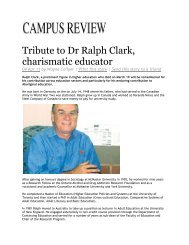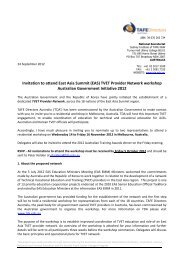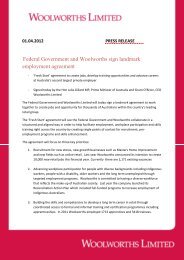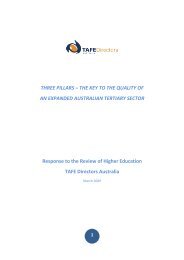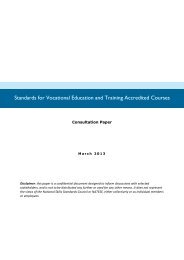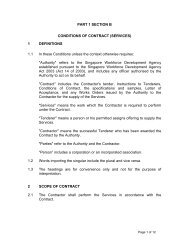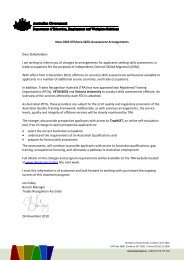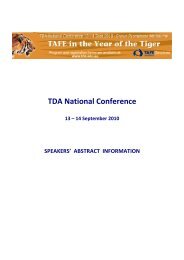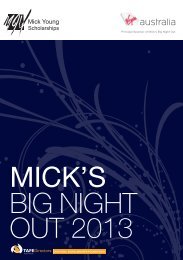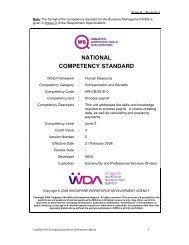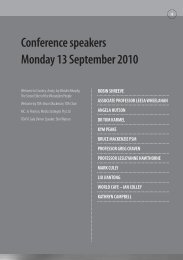TDA policy position papers on tertiary education - TAFE Directors ...
TDA policy position papers on tertiary education - TAFE Directors ...
TDA policy position papers on tertiary education - TAFE Directors ...
Create successful ePaper yourself
Turn your PDF publications into a flip-book with our unique Google optimized e-Paper software.
study offered, not the level of qualificati<strong>on</strong>s or any other features.All categories involve offering Masters (Research) and Doctoraldegrees. This does not foreshadow a more diverse sector.> > The intent of the new Criteri<strong>on</strong> 2 appears to be to create furtherbarriers to entry into the Australian university category and tocurb further diversity of organisati<strong>on</strong>al type by imposing a timeframeand quantum for self-accreditati<strong>on</strong>, effectively preventingany further universities being established domestically for theforeseeable future. 9> > The potential for the ‘Australian University College’ category tobe used as a transiti<strong>on</strong> category to full university status has beenre-introduced 10 (in Criteri<strong>on</strong> 2) but since this potential has existedand was not used in the past, the title may well c<strong>on</strong>tinue toremain superfluous or redundant.> > The research requirement in all three categories is problematicfrom a number of points of view:> The recent report <strong>on</strong> Excellence in Research for Australia 11shows that the current research output varies widely acrossthe university sector with some universities having <strong>on</strong>lysmall pockets of research excellence.> It unnecessarily reinforces exclusivity in an increasinglydiverse <strong>tertiary</strong> educati<strong>on</strong> market.> It is not c<strong>on</strong>sistent with internati<strong>on</strong>al practice.> It leads to already scarce research dollars being potentiallyspread even more thinly..The latest changes to the Provider Categories have d<strong>on</strong>enothing to foster diversity in <strong>tertiary</strong> educati<strong>on</strong>.The intent has been to strengthen the exclusivity of thecategories where the title ‘university’ is used, even thoughthere are currently no providers in these categories and thereis <strong>on</strong>ly limited distincti<strong>on</strong> between them.There is no provisi<strong>on</strong> for a teaching-<strong>on</strong>ly category of universityalthough, in practice, some universities appear to be moving inthis directi<strong>on</strong>.9It is noted here that while the April 2011 c<strong>on</strong>sultati<strong>on</strong> draft of the TEQSA ProviderStandards has changed the basis for self-accreditati<strong>on</strong> from a course-by-coursebasis to a more holistic programmatic approach, thus loosening the requirementssomewhat, this does not change the restrictiveness of Criteri<strong>on</strong> 2.10The previous Protocol D c<strong>on</strong>tained provisi<strong>on</strong>s that: ‘This title (University College)will be … reserved for use by new universities, which at point of establishment,need <strong>on</strong>ly undertake research and research training in <strong>on</strong>e field. It may also be usedby provisi<strong>on</strong>ally approved ‘greenfield’ instituti<strong>on</strong>s based <strong>on</strong> a plan, which wouldnormally be mentored by an existing university’.11Excellence in Research for Australia 2010 – Nati<strong>on</strong>al Report, 2010, AustralianResearch Council, Australian Government, Canberra.<strong>TAFE</strong> DIRECTORS AUSTRALIA9



